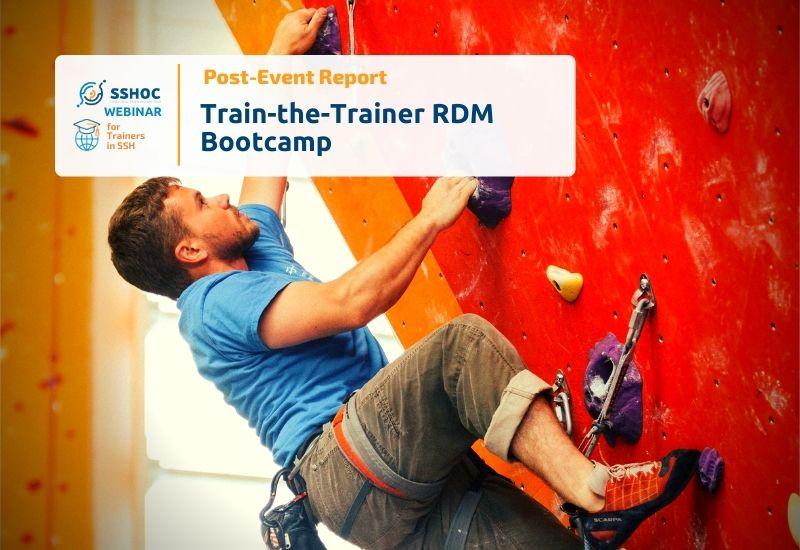
- Social Sciences & Humanities Open Cloud
SSHOC-DARIAH Train-the-Trainer Research Data Management Bootcamp

Date:
15 March 2021
The fundamental changes in the research culture of our days are giving rise to new data support roles across Europe. These professionals work under very diverse geographical and institutional settings but usually come with a domain-specific focus of expertise (SSH, Law, Engineering etc.). In some cases, they are librarians, archivists and experts on standardization who already have a long and proven track record in connecting research communities with primary resources as well as with good practices to interact with them; and Research Data Management (RDM) support comes as a natural extension of their professional profiles. In some other cases, we see the emergence of data steward, data librarian, Open Science officer roles (either full-or part-time or on project-basis, and not only in The Netherlands :-)) whose professionalization is growing along with the development of open and FAIR mandates across Europe.
A shared take-away of the training activities around the SSHOC project, and DARIAH’s Research Data Management support work is that there is a strong need for these new data support professionals in the Social Sciences and Humanities to gain practical, hands-on experiences and exchange around key RDM topics in order to reduce the gaps between the nascent European and national FAIR and open data mandates and the research realities.
To support this goal, and make sure that attendees of the training event will surely have the chance to test and anchor the learning materials in their own working environments, we chose a virtual bootcamp format for the training event. This included 2 half-days on the 8th and 11th of February 2021, with a break in between to allow for independent study.
Day 1: Introduction to the 3 key topics of the workshop
On the first day, participants had been introduced to their trainers and to the 3 special foci of the event that we recognized as the biggest gaps or challenges in the current SSH RDM discourse :
| Topic | Trainer(s) | Material |
|---|---|---|
| Planning to meet the costs of managing research data to be FAIR |
Angus Whyte (DCC / FAIRsFAIR) Annalisa Montesanti (DCC/Health Research Council) Joy Davidson (DCC) Ryan O’Connor (DCC) |
http://doi.org/10.5281/zenodo.4518901 |
| GDPR and Ethical issues in working with social media data | Katrin Weller & Oliver Watteler (GESIS) | http://doi.org/10.5281/zenodo.4518893 |
| Dealing with third-party data coming from Cultural Heritage institutions (galleries, museums, libraries, archives | Kristen Schuster (King’s College London) | http://doi.org/10.5281/zenodo.4518889 |
Participants received expert training from leading practitioners and trainers in the field of Research Data Management, and had the opportunity to specialise in a key area of interest and also to receive peer feedback on an assignment to be completed between sessions.
Day 2: Reflections, reflections, reflections and an interactive didactics session
On Day 2 participants reconvened to the same three topic-specific breakout groups of Day 1, to share and discuss their completed assignments. The exchange sessions were followed by an interactive plenary dedicated to RDM didactics, provided by Kerstin Helbig from the Humboldt University.
| Topic | Trainer(s) | Material |
|---|---|---|
| RDM Didactics | Kerstin Helbig (Humboldt-Universität zu Berlin) | http://doi.org/10.5281/zenodo.4543240 |
Materials are openly available
Importantly, we do not only organize RDM training events but are also seeking ways to implement good practices ourselves when it comes to the coverage and sharing of outputs. As a result, videos, abstracts, slides from the plenary sessions have been made available through YouTube and our Zenodo accounts for those who could not attend the event and would like to learn more about these topics. You are welcome to watch, download, explore or reuse them.
Video recordings:
- Video recordings are available either under the following playlist https://youtube.com/playlist?list=PLpuwwe1MpnqJGmch07_HsZkMBYPV_zkHH
- Or individually:
- Planning to meet the costs of managing research data to be FAIR: https://youtu.be/Aeh5stZhxOQ
- GDPR & Ethical Issues with Social Media Data: https://youtu.be/CWQFAhVSPUQ
- Dealing with third party data coming from cultural heritage institutions: https://youtu.be/BPeUxFdSK_8
- Didactics – 7 steps of concept development: https://www.youtube.com/watch?v=a9FZ1gzZUcU&list=PLpuwwe1MpnqJGmch07_HsZkMBYPV_zkHH&index=5
Session descriptions and slides:
Session descriptions and slides are available via Zenodo:
- Whyte, Angus, Davidson, Joy, O’Connor, Ryan, & Montesanti, Annalisa. (2021, February). Planning to meet the costs of managing research data to be FAIR. Zenodo. http://doi.org/10.5281/zenodo.4518901
- Schuster, Kristen. (2021, February). Dealing with third party data coming from cultural heritage institutions. Zenodo. http://doi.org/10.5281/zenodo.4518889
- Weller, Katrin, & Watteler, Oliver. (2021, February). GDPR & Ethical Issues with Social Media Data. Zenodo. http://doi.org/10.5281/zenodo.4518893
- Helbig, Kerstin. (2021, February). Didactics – 7 steps of concept development. Zenodo. http://doi.org/10.5281/zenodo.4543240
This article appeared first on DARIAH Open
